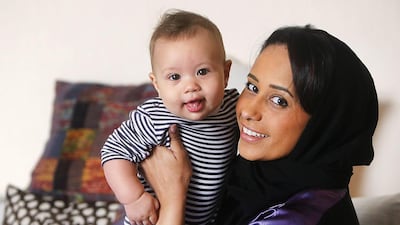ABU DHABI // Mothers and caregivers have been selected for a special course to help them better understand how children develop.
Ten women were chosen to take part in the Shamsa bint Mohammed Al Nahyan Fellowship in Early Childhood Development provided by Sheikha Salama bint Hamdan Foundation in collaboration with Yale University.
Sharifa Yateem, 28, who is a consultant specialist at the New England Centre for Children, said she works with autistic children from the age of 18 months and upwards.
She said the course had provided her with valuable information about how social experiences affect a child’s development.
“It helped me to see what the difficulties a child with autism would have, and in which areas of development that those difficulties happened,” she said. “It gives you more understanding to help the parents as well.”
Early intervention is important for training children with autism, Ms Yateem said.
She said the professors had helped her to “understand more the importance of looking at the child to develop their cognitive, language, social and physical abilities”.
“We need to look at ways of developing these skills. It is important, as early and as young as possible, to involve the child socially to improve all of their skills to develop and be leaders in the future.”
Khawla Saleh, a mother of two who works as a public health practitioner, said she learnt how a parent’s understanding of their child’s emotional needs affects behavioural stages during the first five years life.
“If the parent gets to understand their child more, you can actually prevent safety hazards like neglect, abuse and probably prevent household injuries,” she said.
“The foundation has identified that there is a lot of education and a lot of awareness needed to raise a country, for the future of the UAE. I realised there was a gap on the communication level and a lack of understanding of the importance of what early child development was,” she said.
Ms Saleh said she learnt the importance of “fatherly fathering” and emotional intelligence throughout the course.
“Children feed off our emotions, yes, but they also learn from our emotions. Children communicate from the day they are born. If parents sit and observe they can understand more of the child’s needs, and where their emotional level is, and it helps you relate more and interact more.”
Another fellow, Gabriela Shaat, from Romania, said she was able to learn how to improve the understanding of early child development.
Ms Shaat, who works as a lactation consultant at the Corniche Hospital in Abu Dhabi, said she tries to teach parents about the baby’s emotional needs soon after its birth.
“I try to convey to parents that babies come into the world ready to communicate their feelings, needs and wants through their facial expressions and body language.
“Learning and interpreting baby cues can help the parents to provide a sensitive and nurturing environment where babies feel safe.
“At the same time, it builds up the confidence of mothers and fathers as parents when they are able to read and meet their babies’ needs, thus making them the desired ‘best parents in the world’,” she said.
aalkhoori@thenational.ae

